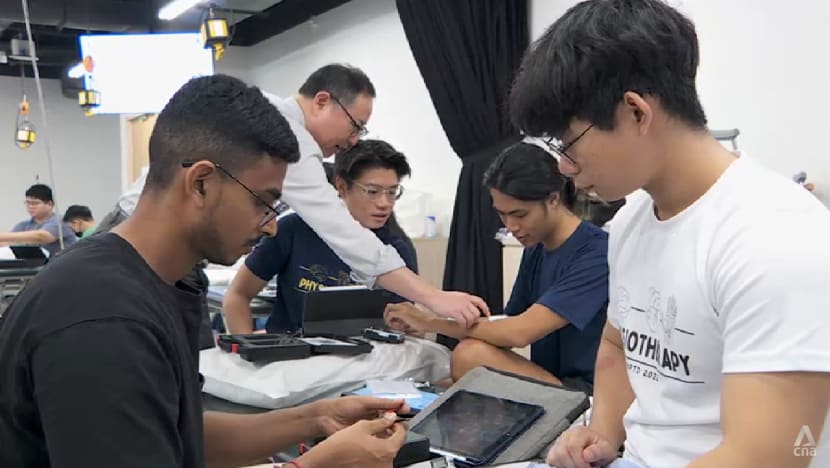Healthcare, maritime sectors tackle local talent shortage by redesigning jobs, creating work stints for undergraduates
Singapore's only physiotherapy degree programme, for instance, produces about 200 graduates a year, which some believe is not enough to meet the sector's talent needs.

Singapore's only physiotherapy degree programme at the Singapore Institute of Technology (SIT) produces around 200 graduates a year.
SINGAPORE: Some sectors such as healthcare and maritime are taking steps to build a more sustainable pool of local talent.
These sectors are addressing their current skills shortage in the local workforce by redesigning jobs and creating more employment stints for pre-graduates.
The Ministry of Manpower said that its shortage occupation list, which pins down roles with a lack of talent, will be reviewed every three years.
Occupations could also be added or removed from the list annually if required by market conditions.
The shortage occupation list is part of the points-based Complementarity Assessment Framework (COMPASS), which allows firms to hire foreign talent with highly specialised skills that are currently in shortage in the local workforce. The long-term aim is to develop local talent in those areas.
HIGHER HEALTHCARE DEMANDS AMID AGEING POPULATION
Physiotherapists, for example, are on the list of 27 jobs where skills are in shortage here.
Singapore's only physiotherapy degree programme at the Singapore Institute of Technology (SIT) produces around 200 graduates a year.
Observers believe this is not quite enough to meet the sector's need for talent, given the higher demand for physiotherapy services amid the nation's ageing population.
As such, the university is raising its cohort intake.
“Physiotherapy is a highly-skilled profession and the training is complex. You need to attract the correct candidates with the right attributes and fit. In particular, the shortage is in the area of experienced therapists,” said Associate Professor Ong Peck Hoon, programme leader for physiotherapy at SIT.
“(While) we look at the training of new graduates, we also need to think about the training of experienced therapists, in order to support their development.”
An initiative by SIT is also in place to allow students to volunteer at clinics.
This will help them gain working experience, and better prospects of a full-time role in the sector.
SOME ROLES IN MARITIME, AGRICULTURE HARDER TO FILL
However, some experts said other roles such as those in maritime and agriculture may be even harder to fill.
“The perception is that (those occupations are) more archaic and blue-collar pursuits, and side by side, far less glamorous than your banking jobs, health care jobs,” said Mr Richard Bradshaw, managing director for Asia at recruitment firm Ethos BeathChapman.
To attract more talent, the maritime sector is redesigning some job roles. It is also raising the appeal of one role that ensures safe ship operations and compliance.
“As we embark on more automation with technological advancement, can some parts of this role be undertaken by technology?” he added.
“We have got more sensors on board the ship. We are into the era of the Internet of Things (IoT), so we can have more real-time monitoring. So some parts of this role could be done with the aid of technology and digitalisation.”




















